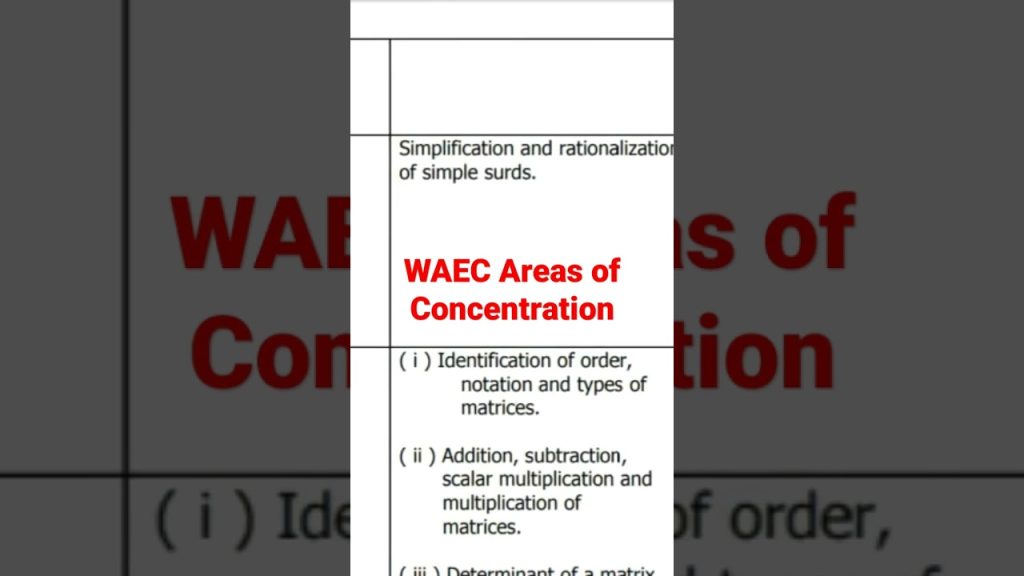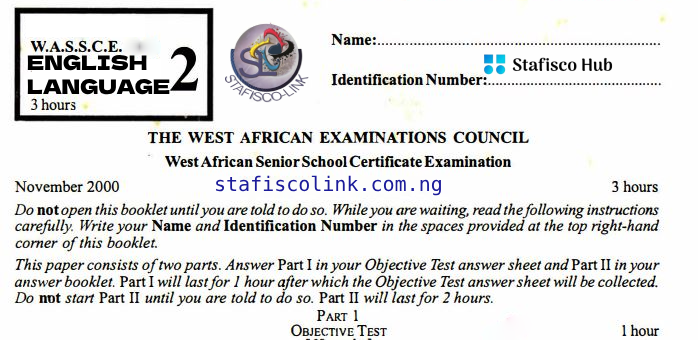WAEC Areas of Concentration for Economics 2024/2025
Are you preparing for the WAEC Economics exam in 2024/2025? If yes, then you might be wondering what topics you should focus on and how to study effectively. In this blog post, we will provide you with some useful tips and information on the WAEC Areas of Concentration for Economics 2024/2025. We will also recommend some textbooks and resources that you can use to enhance your learning and performance.

What are the WAEC Areas of Concentration for Economics 2024/2025?
The WAEC Areas of Concentration for Economics 2024/2025 are the key topics and concepts that have a higher probability of being tested in the WAEC Economics exam. These are based on the WAEC syllabus for Economics, which outlines the aims, objectives, and content of the subject. The WAEC Areas of Concentration for Economics 2024/2025 are:
- The Field of Economics: This covers the fundamental concepts and principles of economics, such as scarcity, choice, opportunity cost, production, distribution, consumption, economic systems, and economic problems.
- Methods and Tools of Economic Analysis: This covers the scientific approach and basic tools of economic analysis, such as tables, charts, graphs, measures of central tendency, and measures of dispersion.
- The Theory of Demand: This covers the meaning and determinants of demand, demand schedules and curves, changes in quantity demanded and demand, types and determinants of elasticity of demand, and significance of elasticity of demand for consumers, producers, and government.
- The Theory of Supply: This covers the meaning and determinants of supply, supply schedules and curves, changes in quantity supplied and supply, types and determinants of elasticity of supply, and significance of elasticity of supply for producers and government.
- The Theory of Consumer Behaviour: This covers the utility concepts, the law of diminishing marginal utility, consumer equilibrium, and the relationship between marginal utility and demand.
- The Theory of Price Determination: This covers the concept of the market, the interaction between demand and supply, equilibrium price and quantity, effects of changes in supply and demand, price controls, and algebraic determination of equilibrium price and quantity.
- The Theory of Production: This covers the concept of production, division of labor, specialization, scale of production, total, average, and marginal productivity, the law of variable proportions, and the relationship between productivity and cost.
- The Theory of Cost and Revenue: This covers the concept of cost, types and determinants of cost, cost curves, the concept of revenue, types and determinants of revenue, revenue curves, and the relationship between cost and revenue.
- Market Structures: This covers the concept of market structure, types and characteristics of market structures, such as perfect competition, monopoly, monopolistic competition, and oligopoly, and the behaviour and performance of firms under different market structures.
- Business Organizations: This covers the concept of business organization, types and characteristics of business organizations, such as sole proprietorship, partnership, corporation, cooperative, and public enterprise, and the advantages and disadvantages of each type of business organization.
- Distributive Trade: This covers the concept of distributive trade, types and functions of distributive trade, such as wholesaling, retailing, and e-commerce, and the problems and prospects of distributive trade in Nigeria.
- Population and Labour Market: This covers the concept of population, factors affecting population size and growth, population structure and distribution, population policies and problems, the concept of labour market, factors affecting labour supply and demand, types and causes of unemployment, and the effects and solutions of unemployment.
- Agriculture: This covers the concept of agriculture, types and importance of agriculture, agricultural production and productivity, factors affecting agricultural production and productivity, agricultural policies and problems, and the role and challenges of agriculture in economic development.
- Industrialization: This covers the concept of industrialization, types and importance of industrialization, industrial production and productivity, factors affecting industrial production and productivity, industrial policies and problems, and the role and challenges of industrialization in economic development.
- National Income: This covers the concept of national income, methods and problems of measuring national income, circular flow of income, components and determinants of national income, national income accounting, and the use and limitations of national income statistics.
- Money and Inflation: This covers the concept of money, functions and characteristics of money, types and forms of money, money supply and demand, the concept of inflation, types and causes of inflation, effects and control of inflation, and the relationship between money and inflation.
- Financial Institutions: This covers the concept of financial institutions, types and functions of financial institutions, such as banks, non-bank financial institutions, and capital market institutions, and the role and problems of financial institutions in economic development.
- Public Finance: This covers the concept of public finance, public revenue and expenditure, sources and types of public revenue and expenditure, public budget and budget deficit, public debt and debt management, and the effects and implications of public finance on the economy.
- Economic Development and Planning: This covers the concept of economic development and planning, indicators and measures of economic development, factors affecting economic development, obstacles and strategies of economic development, types and objectives of economic planning, methods and problems of economic planning, and the role and challenges of economic planning in Nigeria.
- International Trade and Balance of Payments: This covers the concept of international trade and balance of payments, theories and basis of international trade, gains and losses from international trade, terms of trade and balance of trade, balance of payments accounts and equilibrium, causes and consequences of balance of payments disequilibrium, and measures to correct balance of payments disequilibrium.
- Economic Integration: This covers the concept of economic integration, types and levels of economic integration, such as free trade area, customs union, common market, and economic union, benefits and costs of economic integration, and the role and challenges of economic integration in West Africa.
- International Economic Organizations: This covers the concept of international economic organizations, types and functions of international economic organizations, such as the World Bank, the International Monetary Fund, the World Trade Organization, and the African Development Bank, and the role and challenges of international economic organizations in economic development.
- Major Natural Resources: This covers the concept of natural resources, types and importance of natural resources, such as land, water, minerals, oil, gas, and forest, and the role and challenges of natural resources in economic development.
What are the Recommended Textbooks for Economics 2024/2025?
To prepare effectively for the WAEC Economics exam, you need to use reliable and relevant textbooks that cover the WAEC syllabus for Economics. Here are some of the recommended textbooks for Economics 2024/2025:
- Aderinto, A.A et al. (1996) Economics: Exam Focus
- Black, J. (1997) Oxford Dictionary of Economics
- Fajana, F et al. (1999) Countdown to SSCE/JME Economics
- Lipsey, R.G. (1997) An Introduction to Positive Economics
- Udu E and Agu G.A. (2005) New System Economics: a Senior Secondary Course
You can also use other textbooks that are approved by the WAEC and your school. In addition, you can use online resources, such as the WAEC e-Learning portal, where you can access past questions and answers, chief examiner’s reports, and other useful materials.
What are the Study Tips and Advice for Economics 2024/2025?
Studying for the WAEC Economics exam can be challenging, but with the right tips and advice, you can ace it in one sitting. Here are some of the study tips and advice for Economics 2024/2025:
- Set attainable study goals: Before you start studying, set specific and realistic goals for yourself, such as the topics you want to cover, the time you want to spend, and the scores you want to achieve. This will help you stay focused and motivated.
- Create a study plan: A study plan is a schedule that helps you organize your study time and activities. It helps you allocate adequate time for each topic and subject, and avoid cramming and procrastination. You can use a calendar, a planner, or an app to create your study plan.
- Start studying early and take notes: The earlier you start studying, the better. This will give you enough time to review and revise the topics and concepts. As you study, take notes of the key points, definitions, formulas, and examples. You can use different methods of note-taking, such as outlining, summarizing, or mapping. You can also use different tools, such as notebooks, flashcards, or apps.
- Take mock exams and practice tests on uLesson: One of the best ways to test your knowledge and prepare for the WAEC Economics exam is to take mock exams and practice tests. These will help you familiarize yourself with the exam format, questions, and time limit. They will also help you identify your strengths and weaknesses, and improve your speed and accuracy. You can use uLesson, an online learning platform that offers mock exams and practice tests for WAEC Economics and other subjects. You can also get feedback and explanations for each question and answer.
- Ask for help: If you encounter any difficulty or confusion while studying, do not hesitate to ask for help. You can ask your teachers, classmates, tutors, or online
Summary
In this blog post, we have discussed the following points:
- The WAEC Areas of Concentration for Economics 2024/2025 are the key topics and concepts that have a higher probability of being tested in the WAEC Economics exam. They are based on the WAEC syllabus for Economics, which outlines the aims, objectives, and content of the subject.
- The WAEC Areas of Concentration for Economics 2024/2025 cover 22 topics, ranging from the field of economics, methods and tools of economic analysis, the theory of demand and supply, market structures, business organizations, distributive trade, population and labour market, agriculture, industrialization, national income, money and inflation, financial institutions, public finance, economic development and planning, international trade and balance of payments, economic integration, international economic organizations, and major natural resources.
- The recommended textbooks for Economics 2024/2025 are Aderinto, A.A et al. (1996) Economics: Exam Focus, Black, J. (1997) Oxford Dictionary of Economics, Fajana, F et al. (1999) Countdown to SSCE/JME Economics, Lipsey, R.G. (1997) An Introduction to Positive Economics, and Udu E and Agu G.A. (2005) New System Economics: a Senior Secondary Course. You can also use other textbooks that are approved by the WAEC and your school, as well as online resources, such as the WAEC e-Learning portal and uLesson.
- The study tips and advice for Economics 2024/2025 are to set attainable study goals, create a study plan, start studying early and take notes, take mock exams and practice tests on uLesson, ask for help, review and revise regularly, and stay healthy and confident.
We hope that this blog post has been helpful and informative for you. We wish you all the best in your WAEC Economics exam in 2024/2025.
Frequently Asked Questions and Answers
Here are some of the frequently asked questions and answers about WAEC Areas of Concentration for Economics 2024/2025:
- Q: How many questions are there in the WAEC Economics exam?
- A: The WAEC Economics exam consists of two papers: Paper 1 and Paper 2. Paper 1 is a multiple-choice paper that contains 50 questions and lasts for 50 minutes. Paper 2 is an essay paper that contains 8 questions and lasts for 2 hours. You are required to answer 5 questions out of the 8 questions in Paper 2.
- Q: How is the WAEC Economics exam graded?
- A: The WAEC Economics exam is graded according to the WAEC grading system, which assigns grades from A1 to F9 based on the percentage score obtained. The grades and their corresponding percentage scores are as follows:
Table
| Grade | Percentage Score |
|---|---|
| A1 | 75% – 100% |
| B2 | 70% – 74% |
| B3 | 65% – 69% |
| C4 | 60% – 64% |
| C5 | 55% – 59% |
| C6 | 50% – 54% |
| D7 | 45% – 49% |
| E8 | 40% – 44% |
| F9 | 0% – 39% |
- Q: What are the benefits of studying the WAEC Areas of Concentration for Economics 2024/2025?
- A: Studying the WAEC Areas of Concentration for Economics 2024/2025 can help you to:
- Understand the scope and depth of the WAEC Economics syllabus and exam.
- Focus on the most important and relevant topics and concepts for the WAEC Economics exam.
- Save time and energy by avoiding unnecessary and irrelevant topics and concepts.
- Improve your knowledge and skills in economics and related subjects.
- Boost your confidence and performance in the WAEC Economics exam.

